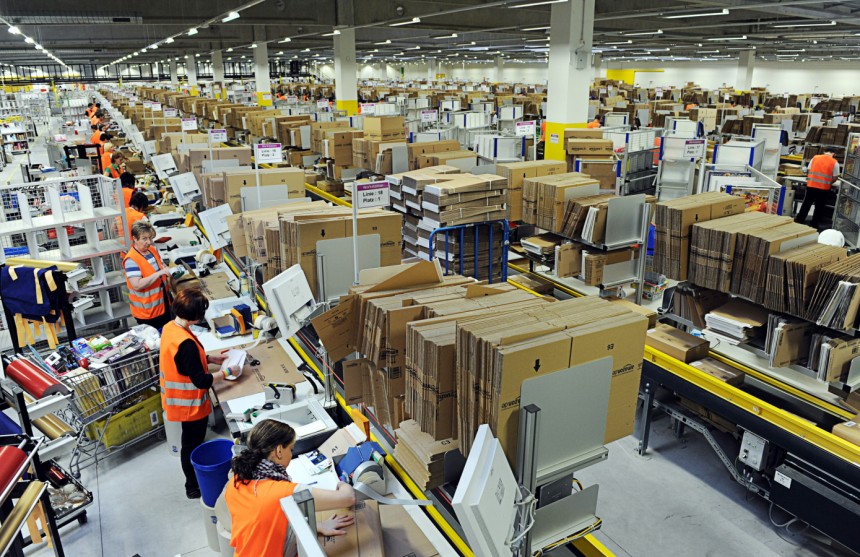New York lawsuit against Amazon highlights poor conditions for workers during the pandemic
February 25, 2021
New York is suing Amazon.com Inc. for not providing workers with adequate working conditions and not adhering to social distancing guidelines in workspaces. This lawsuit is led by New York Attorney General Letitia James but reflects the ongoing issue of workers’ treatment by companies during the COVID-19 pandemic.
In the filing, New York is suing Amazon for violating Labor Law § 200 and jeopardizing the health of employees,specifically at their Staten Island fulfillment center and Queens distribution center.
This law states that it is the duty of employers to create facilities that protect the health and well-being of employees.
“While Amazon and its CEO made billions during this crisis, hardworking employees were forced to endure unsafe conditions and were retaliated against for rightfully voicing these concerns,” James said.
“Since the pandemic began, it is clear that Amazon has valued profit over people and has failed to ensure the health and safety of its workers. The workers who have powered this country and kept it going during the pandemic are the very workers who continue to be treated the worst. As we seek to hold Amazon accountable for its actions, my office remains dedicated to protecting New York workers from exploitation and unfair treatment in all forms,” she added.
New York also cited evidence in the case that Amazon had known of at least “250 cases of COVID-19 in its Staten Island warehouse. For more than 90 cases, the infected employee had been at work in the previous week, yet Amazon did not close portions of the building to provide proper ventilation as the state required,” according to The New York Times.
Furthermore, the lawsuit states that “Amazon failed to speak with infected employees to find out with which other employees they had close contact,” and continues to do so unless an infected worker provides proof that they have tested positive.
During the pandemic, Amazon has also faced backlash for using surveillance against its employees to prevent unionization, yet failing to use that technology to identify workers potentially exposed to sick workers.
By not informing other employees who worked the same shift or even the same day as the infected employee immediately, many employees are put at risk for contracting the coronavirus.
Hence, Amazon’s failure to act with urgency led to more COVID-19 cases among employees.
Amazon, however, believes that it has taken care of its employees and has complied with sanitizing and social distancing requirements.
“We don’t believe the attorney general’s filing presents an accurate picture of Amazon’s industry-leading response to the pandemic,” Kelly Nantel, a spokeswoman for Amazon, said.
This lawsuit raises awareness of a festering problem during the pandemic: working conditions.
The filing states that Amazon violated New York Labor Law § 215 and §740, which are anti-retaliation and whistleblower protection laws. These laws are especially important now, considering that there are not many job opportunities available.
The case specifically points out Christian Smalls, an Amazon employee who was fired in March 2020 for reporting how Amazon was failing to provide sanitary conditions and mishandling news of cases.
Other states have dealt with similar issues of companies punishing whistleblowers looking for safety in their workplaces.
For instance, four McDonald Corp,’s employees in California were punished for reporting unsafe working conditions. After also participating in protests to have better conditions, they were served with termination letters.
“California law has anti-retaliation protections in place that make it illegal for employers to punish workers for exercising their labor rights, such as reporting a workplace safety hazard. My office is committed to ensuring those laws are enforced,” Labor Commissioner Lilia Garcia-Brower said.
Another important detriment to workers during the pandemic is hazard pay.
Businesses are supposed to comply with the Fair Labor Standards Act’s rules, which states that hazard pay “be included as part of a federal employee’s regular rate of pay in computing the employee’s overtime pay.”
At the start of the pandemic, hazard pay was offered as a courtesy to essential workers who were putting themselves at risk of the coronavirus each day. As time passed, however, that pay has gone away.
Kroger, the largest supermarket by revenue in the United States, recently announced it will close two stores in Seattle. This comes after Kroger vocalized its dissent against mandated hazard pay on the west coast.
It had previously offered an extra $2 in hazard pay per hour, but that expired in May 2020. Now, some cities are requiring $4 hazard pay per hour, which Kroger refuses to implement.
This grocery store chain highlights how businesses have been putting profit over the well-being of workers.
Since the start of the pandemic, Kroger “doubled its profits. It’s made an extra $1.3 billion. And this is even after paying all the costs for cleaning and safety and hazard pay, they made an extra $1.3 billion. And what’s striking is they haven’t given any hazard pay since May. What they have done with some of that profit is they have spent upwards of $1 billion repurchasing their stock,” Molly Kinder of the Brookings Institution, a think tank, said.
Kroger has the resources to provide employees with the extra $4 an hour, but instead chose to redirect it towards keeping an inventory. To many employees, those four dollars would have been much needed financial relief.
With vaccination roll out slowed down in the nation due to weather conditions and a lack of supply, it is unclear when the pandemic will officially be deemed over. Until then, Attorney General James’ lawsuit is a step forward in getting companies to evaluate their operations quickly to ensure that innocent workers are not exposed to the coronavirus.








